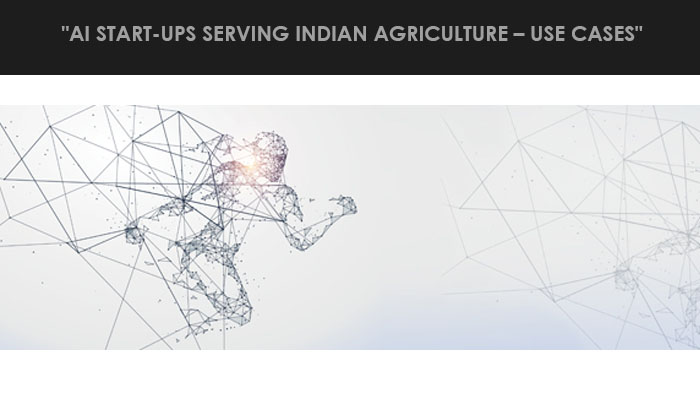Artificial Intelligence in Agriculture
Introduction
Agriculture plays an Essential role in India’s Economy. More than 58 percent of the rural households depend on agriculture as their mainstream mode of livelihood, as per the IBEF report. Agricultural exports constitute 10 percent of the nation’s exports and are still the fourth-largest exported chief commodity class in India.
On the back of improved FDI and conducive Government initiatives, the Agriculture Industry is looking at ways to leverage technologies for superior crop yield. Many tech companies and startups have emerged in the last couple of years with concentrated agro-based solutions which benefit from farmers. The most well-known programs of AI in Indian Agriculture seem to fall into three main classes
Crop and Soil Tracking — Businesses are leveraging detectors and assorted IoT-based technology to track harvest and soil health.
Predictive Agricultural Analytics — Different AI and Machine Learning resources are used to forecast the perfect time to sow seeds, get alerts on dangers from insect attacks, and much more.
Supply Chain Efficiencies– Businesses are utilizing real-time information analytics on data-streams coming from several sources to construct an efficient and clever supply chain.
We’ll explore each of the above-mentioned categories in the agricultural sector, together with representative businesses instances and use-cases.
CROP AND SOIL TRACKING
1. Maximize per-Acre Worth (CropIn)
CropIn, a Bengaluru-based startup that claims to be a highly intuitive, smart, and self-evolving system which provides future-ready farming alternatives to the agricultural industry. The business cites a usage case with among the world’s biggest manufacturers of potato specialties firm based in India which rents plots for farming and contains 2500+ plots spread throughout a place of 5200+ acres.
Before, they used to document farm information manually, thus generating multiple entries that were inconsistent. CropIn’s ‘smartfarm’ geo-tagged all the farmland to discover the true plot area. The answer helped in remote sensing and weather advisory, monitoring and tracking farm actions for whole traceability, teaching farmers on adoption of a proper package of inputs and practices, monitoring crop health and crop yield estimation, and alarms on the pest, diseases etc. Basically, CropIn uses AI to help customers analyze and interpret information to derive real-time technical insights about standing crop and jobs spanning geographies. Its agri-business intelligence alternative named ‘SmartRisk’ frees agro-alternate information and offers hazard mitigation calling for successful credit risk assessment and loan recovery help.
2. Intello Labs — Utilizing Deep Learning for Picture Diagnosis
The business claims to supply innovative image recognition technology which can recognize faces, flora, and fauna and label them in almost any picture. The company claims to utilize deep learning algorithms where a new generation of smart applications are being assembled for applications such as agriculture, eCommerce, promotion, production, and curation.
Farmers across the globe follow conventional farming practices because of lack of accessibility to the scientific comprehension of harvest lifecycle, pests, quality metrics and the most recent micro-fertilizers. Intello Lab’s picture based alternatives provide insights about the plants’ health throughout the growing period and towards the end ensuring a much better-harvested quality through photographs.
Intello Labs claims to supply:
Agricultural Product Grading: Automated quality evaluation of pictures of food items is a true and reliable way of grading new products (fruits, vegetables, grains, cotton etc.) characterized by color, size, and form. Their answer reads the picture a farmer has obtained on his telephone and decides the product quality in real time, with no manual intervention.
The solution utilizes profound learning and picture processing units to recognize any harvest diseases or insect infestation from the plants. Together with the parameters, it provides recommendations on the way that disorder could be treated and prevented by growing further.
Predictive Agricultural Analytics
Microsoft India – AI-based Sowing App
Determining the Proper time to sow plants is often one of those biggest challenges for Indian farmers in which drought and excessive rainfall could be both serious issues. The program sends sowing advisories to engaging farmers on the Optimal date. The very best part is that the farmers do not have to install some other detectors in their own fields or incur any capital expenditure.
To compute the crop-sowing interval, historical climate data (crossing over 30 years in 1986 to 2015) for the particular region in Andhra Pradesh was examined using AI. MAI (Moisture Adequacy Index) is the standardized measure used for analyzing the level of adequacy of rain and soil moisture to fulfill the prospective water requirement of plants.
Microsoft’s partnership with United Phosphorous (UPL) to create the Pest Risk Prediction App is leveraging machine learning and AI technologies to measure and inform regarding the risks of pest attack.
In accordance with the report mentioned previously, in a couple of dozen cities in Telangana, Maharashtra, and Madhya Pradesh, farmers get automatic voice calls alerting them if their plants are in danger of a pest attack according to climate conditions and phase of the harvest.
Gobasco – AI-powered Agro Supply Chain
The start-up claims to use real-time information analytics on data-streams coming from several sources throughout the nation aided with AI-optimized automatic pipelines to radically boost the efficacy of their present agro distribution chain. “Our online agro-marketplace gives the lowest prices for both the
manufacturers and buyers at their fingertips. Gobasco utilizes AI and associated technologies in the various phases of the supply chain. A Number of them are listed under:
Transition Discovery: real statistics evaluation on multiple data-streams together with crowd-sourced information from producer/buyer marketplaces and transporters feeds their automated trade discovery algorithm to acquire high-margin transactions.
Quality Maintenance: Computer vision and AI-based automated grading and exporting is completed for fruits and vegetables for creating a global agro-commodity standard for dependable trading across state boundaries.
Credit Risk Management: Crowd-sourced info, analytics, and algorithms conquer the charge default issue, the hardest problem of present supply-chain, to guarantee an extremely low-risk performance.
Additional Use Cases
Gramophone (Agstack Technologies) – Picture Recognition for Soil Science
Based out of the Indian state of Madhya Pradesh, Gramophone asserts to leverage the power of picture recognition and soil science to assist farmers with timely advice, engineering, and appropriate sort of inputs to attain improved yields. The technology system utilizes AI and machine learning how to forecast disease and pest, predict commodity costs for improved price realizations and urges products to farmers.
Gramophone asserts to reach out to over 100,000 farmers in the country using a productivity improvement of over 50% at the three cropping cycles they have been connected with. Their aim this year is to reach a thousand farmers and localize our stage in several more languages.
Jivabhumi – AI enabled Agro-Marketplace
There’s frequently a mismatch in demand and supply of agricultural produce. While farmers are not able to find appropriate markets for their produce, on the flip side, consumers are short of healthy and inexpensive food. The start-up claims to utilize technologies like blockchain to get the data of produce at different levels in the distribution chain.
The platform joins institutional buyers directly with farmers consequently providing wider audience access to the farmers ensuring fair-trade. Buyers get to find the good produce, reduce cost and have the ability to procure directly from the manufacturers while being convinced about the transparency of this trade and traceability of this produce.
The platform captures comprehensive details concerning the commodities (expanding data, pre-and post-harvest, transport, warehousing etc.) that will likely be pushed via blockchain to yield a digital identity to get a physical product and finally build traceability to demonstrate provenance and movement of commodities from farm to table.
Conclusion
Given the Massive potential of agriculture in India, it is critical that technology is accustomed and leveraged to the maximum level so that both farmers and customers can make the most of it. With recent improvements in technology combined together with conducive government policies, we’ve seen a number of ag-tech startups emerge from the nation. It is a fantastic inception for its penetration of innovative AI technologies in agriculture.
AI comes as a Fantastic blessing to the agricultural sector that is heavily determined by the unpredictable climatic conditions. More AI based ag-tech start-ups are likely to emerge in the long run due to the promising value addition it could bring to the society and the business itself!




 May 29th, 2019
May 29th, 2019 Exito
Exito
Leave a Reply